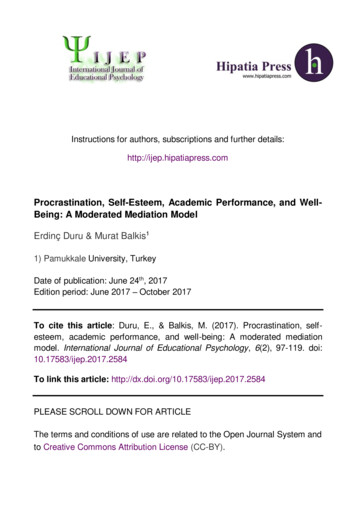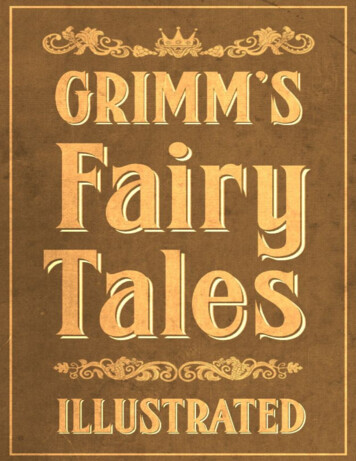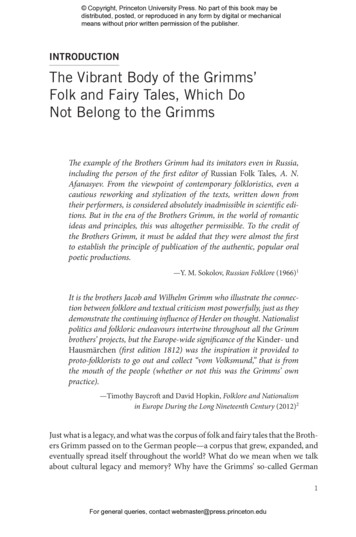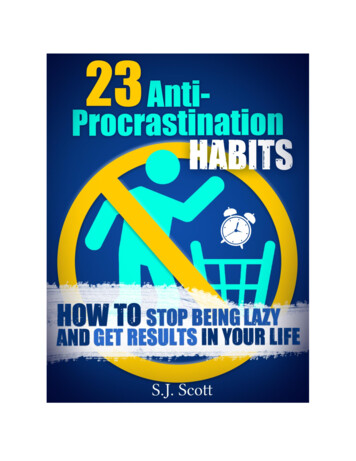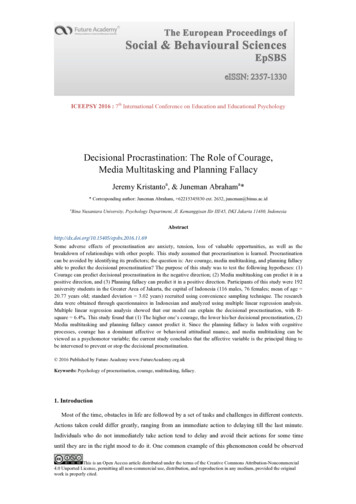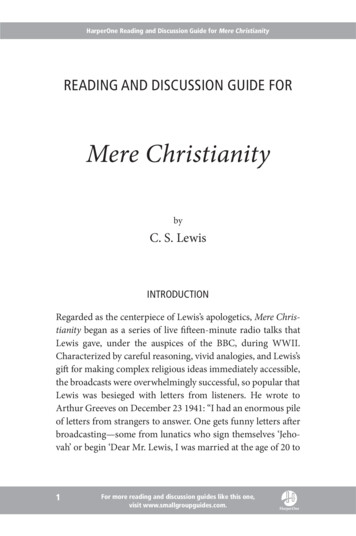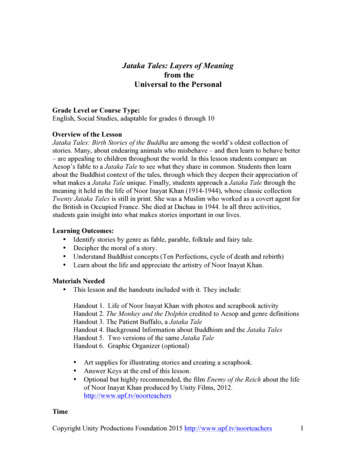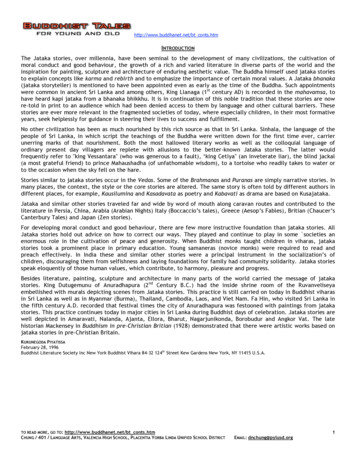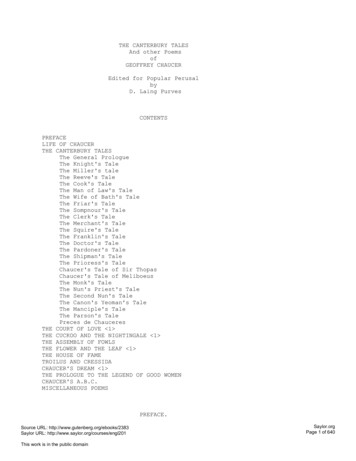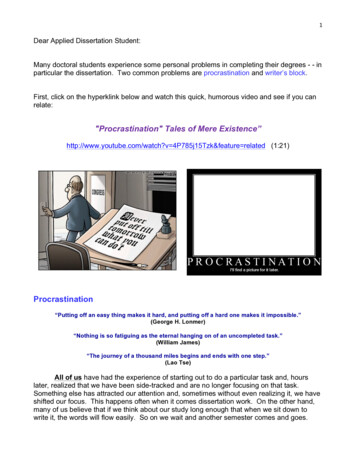
Transcription
1Dear Applied Dissertation Student:Many doctoral students experience some personal problems in completing their degrees - - inparticular the dissertation. Two common problems are procrastination and writer’s block.First, click on the hyperklink below and watch this quick, humorous video and see if you canrelate:"Procrastination" Tales of Mere Existence”http://www.youtube.com/watch?v 4P785j15Tzk&feature related (1:21)Procrastination“Putting off an easy thing makes it hard, and putting off a hard one makes it impossible.”(George H. Lonmer)“Nothing is so fatiguing as the eternal hanging on of an uncompleted task.”(William James)“The journey of a thousand miles begins and ends with one step.”(Lao Tse)All of us have had the experience of starting out to do a particular task and, hourslater, realized that we have been side-tracked and are no longer focusing on that task.Something else has attracted our attention and, sometimes without even realizing it, we haveshifted our focus. This happens often when it comes dissertation work. On the other hand,many of us believe that if we think about our study long enough that when we sit down towrite it, the words will flow easily. So on we wait and another semester comes and goes.
2Writing is time-consuming and angst-ridden. There will never be an ideal time to write,because writing is hard! Therefore, since there is never a better time, you might as well getthat chapter started - - now!According to Webster’s Collegiate Dictionary, procrastinate means to put offintentionally and habitually doing something that should be done. It is a habit that stealsaway some of life’s greatest opportunities, yet it is a habit most of us possess. Many booksdeal with overcoming procrastination, yet we seem to put off reading them or, if we do, fail toheed their advice. This habit, quite common among dissertation students, can result in anABD (all-but-dissertation) status rather than an Ed.D. This amounts to aborting the climb tothe peak and settling for Heartbreak Hill. I am acutely aware of the whole complex ofdazzling excuses proffered by dissertation writers. For some doctoral students, dissertationavoidance is often elevated to an elegant art form. Certainly, there are occasionally excellentreasons for putting off working on your dissertation. Emergencies, interruptions from others,and acts of God happen to all of us from time to time. However, the students I worry aboutare those who keep themselves from starting or continuing because they fear the unknown,lack the self-confidence to move ahead on their own, or engage in irrational thinking, such asawfulizing. They convince themselves the task is awful, horrible, and unbearable. Butputting it off only postpones the inevitable. It is critical that you learn to recognize thosesigns that indicate you are putting off working.You and the Law of InertiaNewton’s law of inertia says: A body in motion tends to stay in motion; a body at resttends to stay at rest. In other words, it takes greater force to get a body moving than it doesto keep it moving, and when it gets moving, it takes less force to keep it moving than to stopit. Physical inertia is regulated by outside forces, but the real changes in our life’s attitudesand habits come from within. As William James, (often referred to as the father of Americanpsychology) said, “The greatest discovery of my generation is that a person can alter his lifeby altering his attitude of mind.” Those who succeed do so because, when they head towarda specific destination, they keep going until they reach it. It’s hard to stop them.There are lots of reasons for procrastinating on the dissertation. Doing a dissertationcalls for a significant shift in working patterns, especially if you have just spent two or threeyears taking courses with other students and having the semester schedule of classes, thetasks to be completed, and the timeline for completion all set by someone else (the
3professors). Now along comes the dissertation and it can be a solitary activity that alsorequires you to make, on your own, many decisions about time allocation, what to work on atany given point and when to contact your faculty advisor.One idea to combat this loneliness is “the writing date” and some of you may haveseen in a three-page article from The Chronicle of Higher Education. This is only onestrategy (there are many), but I do endorse it as often we do not want to disappoint or letdown another person; so we need this extra guilt for motivation. Try it and let me know whatyou think.Writer’s eetofpaper."What's the hardest part of writing? Or, to put it another way, what stage of the writingprocess gives you the most difficulty? Is it drafting? Revising? Editing? Proofreading? Formany of us, the hardest part of all is getting started. Sitting down in front of a computerscreen or a blank sheet of paper, rolling up our sleeves, and--and nothing.We want to write. We may be facing a deadline that should compel us to write. But instead offeeling motivated or inspired, we grow anxious and frustrated. Those negative feelings canmake it even harder to get started. That's what we call "writer's block." If it's any consolation,we're not alone. Even many professional writers--of fiction and nonfiction, poetry and prose-have also had frustrating encounters with the empty page.All dissertation writers experience writer’s block at some point during the process. It’s thatlonging to be anywhere BUT in front of the computer. When this happens, everything else inyour life takes priority over writing. Taking the dog for a walk, cleaning your closets, runningerrands, washing clothes, and emailing friends appear crucial. Writer’s block can be causedby any number of factors: lack of confidence, fear, time constraints, no outline, personalissues, frustration with your topic, perfectionism, weariness, etc. It is important to identifyobstacles that stifle your writing. In other words, take time to “fall back and regroup.”
4Here are some helpful resources:The Writing Life by Stephen King, Sunday, October 1, ticle/2006/09/28/AR2006092801398 pf.htmlSymptoms and Cures for Writer's 7/01/Writers on Writing: Overcoming Writer's ockquotes.htmTop 10 Tips for Overcoming Writer's dblocks/tp/block.htmOvercoming Writer's ition/brainstorm block.htmVideos:Bob Moresco of Crash on Writers Blockhttp://www.youtube.com/watch?v qpVagt oGRo(1:36)How to Overcome Writer's Block -- Your Writing Coachhttp://www.youtube.com/watch?v K7jfPXclP6Y&feature related(4:16)How to Become a Professional Writer: How to Handle Writers' Blockhttp://www.youtube.com/watch?v SHI3xBZVt7s&feature related(2:54)Dissertation Specific:Writing your dissertationhttp://www.youtube.com/watch?v z9TFZ6blzAg&feature related(7:02)Dissertation Camp: Writing Tips (48minutes)http://www.youtube.com/watch?v xBS9AIq7m28(48:01)
5Humorous:J Dissertation Blueshttp://www.youtube.com/watch?v NmOepdJn6LE(2:08)“The I hate dissertations” songhttp://www.youtube.com/watch?v QfUILZ3SUgc&feature related(2:16)Okay, now that you have gotten through this dissertation newsletter, go write! Get to work; donot procrastinate any longer! Do not get up until you have written about 400 words or spenta good hour clicking away in front of the computer. Do not clean the house, turn on thetelevision, go to the fridge, or take a walk, until you have put some words on paper. Then youcan take a break. You will feel so much better and then one or two pages will soon becomethree to four pages. Okay?Best wishes,Robert HillRobert Hill, Ed.D.Applied Dissertation Chair & Program ProfessorSome of this was taken from:
6Completing a Professional Practice Dissertation: A Guide for Doctoral Students and Faculty (2010) by JerryWillis, Deborah Inman, & Ron Valenti from IAP.The Dissertation Journey: A Practical and Comprehensive Guide to Planning, Writing, and Defending yourDissertation (2004) by Carol M. Roberts from Corwin Press.Writing the Winning Thesis of Dissertation: A Step-by-Step Guide (2L. Joyner from Corwin Press.nded.) (2005) by Allan A. Glatthorn & Tandy
Many books deal with overcoming procrastination, yet we seem to put off reading them or, if we do, fail to heed their advice. This habit, quite common among dissertation students, can result in an ABD (all-but-dissertation) status r
